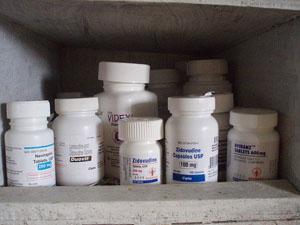GlaxoSmithKline allows generic AIDS drugs
(Image: Flickr user shortie66 (cc: by-nc-sa))
A slum in the Kenyan capital, Nairobi, was the setting for a surprise announcement. The speaker was Andrew Witty, chief executive of pharmaceutical giant GlaxoSmithKline. The topic: the drugs made by the company for the treatment of HIV and AIDS.
"We’re now issuing voluntary licenses free of royalties, so with no charge, to generic companies who can now get on and manufacture their versions of our medicines, if you will, and make sure there is maximum volume available. So we’ve done this previously for what I call first-line HIV treatment, this is the first time it’s been applied to a second-line or more advanced treatment," said Witty.
What that means is that GlaxoSmithKline is waiving its patent rights on several key medicines, and that could mean cheaper drugs for millions of people living with HIV around the globe.
Katy Athersuch is coordinator for the Stop AIDS Campaign-UK. She thinks the announcement amounts to a publicity stunt, "It’s relatively good news, but this isn’t really such a breakthrough announcement. Lots of other companies have already done voluntary licenses that Andrew was referring to. But the devil in the detail of the GSK announcement — it’s not only that the voluntary licenses are one company only, so weren’t necessarily lower priced — but also that this announcement has come on the day that the UK government has called on pharmaceuticals to join the patent pool set up by UNITAID.
"And Witty, he explicitly said in the announcement that they would not be signing up to the HIV patent pool, which is for us very, very disappointing. I mean, to be honest, I definitely think it’s a PR stunt."
Athersuch explains the importance of the patent pool: "So, the international drug patent facility called UNITAID, which is based in Geneva, but headed up by France, the UK, Norway, Chile and Brazil; has set up a proposal to basically ask companies voluntarily to put their patents that they own on HIV drugs into a pool which would allow many generic manufacturers to make cheap copycat versions of those pills to sell in the developing world. And the other thing about the patent pool is that companies will then be paid a royalty fee from the generic manufacturers, so that they also get a benefit from joining in with the proposal."
She does think there’s something to be said about the GlaxoSmithKline announcement, but that the pharmaceutical company can go a lot further, "It will definitely save some lives, and it’s defiantly welcome that they’re looking to do more, particularly in relation to children living with HIV.
"But it’s just a shame that, when there’s such a great proposal of the patent pool on the table — that would really revolutionize access to treatment, and see many more people accessing these drugs at an affordable price — that GSK has not come forward and endorsed the patent pool, is very disappointing. And they could go a lot further, and we call on them to go a lot further.
"There is, I’m, I rule it’s a PR exercise, some lives will be saved, which obviously is very, very welcomed, but more could be saved if they went a bit further."
PRI’s "The World" is a one-hour, weekday radio news magazine offering a mix of news, features, interviews, and music from around the globe. "The World" is a co-production of the BBC World Service, PRI and WGBH Boston.
